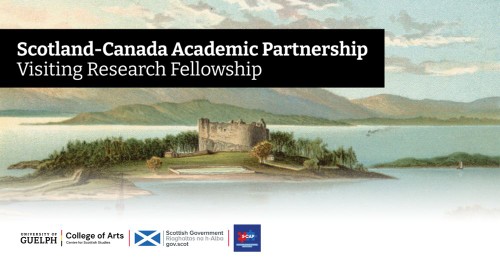Scotland-Canada Academic Partnership (S-CAP)
The Scotland-Canada Academic Partnership (S-CAP) is a partnership between the Centre for Scottish Studies (CSS) at the University of Guelph and the Scottish Government Office in Canada (SG Canada).
Officially launched on 12 September 2024 at the University of Guelph, S-CAP aims to (1) promote communication between scholars in Canada and Scotland with mutual research interests; (2) highlight their research to the wider community; and (3) bring them into closer contact to nurture new research agendas, across a broad range of disciplines and domains.
Scholars in Canada and Scotland who are engaged in shared research projects; and engaged in research focussed in part or in whole on the other country are invited to join the S-CAP mailing list to receive information of relevance from CSS and SG Canada. Partners will also have the opportunity to engage in workshops organised around research topics and questions of mutual interest.
To become involved and join S-CAP, please contact CSS: scottish@uoguelph.ca.
We look forward to building a vibrant scholarly network to promote mutual interests and nurture new research agendas and collaborations.
NEWS & EVENTS
Scotland-Canada Academic Partnership (S-CAP) Visiting Research Fellowships – Call for Applications (2026)
S-CAP Visiting Research Fellowships are designed to foster original research and scholarship by scholars utilizing the University of Guelph’s Scottish Studies Collection. Two fellowships, each valued at CAD$1,500, are intended to support research using the Scottish archival collections held at the University of Guelph’s McLaughlin Library. They are supported by the Centre for Scottish Studies at the University of Guelph and the Scottish Government Office in Canada. The Fellowships provide a stipend intended to help defray living, travel, and/or research expenses of researchers to come to the University of Guelph to conduct their research utilizing the Scottish Studies Collection. This fellowship is not intended to cover any tuition costs in whole or in part.
Deadline for submission of applications: 15 March 2026.
You can visit the McLaughlin Library (University of Guelph) webpage for full Fellowship Details.
Past Events
On 10 February 2026, Professor Karly Kehoe delivered the 2026 Annual S-CAP Lecture, ‘Nova Scotia and the Imperial Strategies of Highland Scots'. This talk explored the legacy of colonial privilege by looking at patterns of Scottish Highland settlement in Nova Scotia. Catholic Highlanders made use of the spectrum of advantages inherent in the White European settler experience despite facing significant persecution at home. Examining their connections with the process of empire building builds a deeper understanding of the complexities of colonization and helps us to think about Scottish History’s connection with Canada’s reconciliation process.
Karly Kehoe is Professor of History at Saint Mary’s University in Halifax, Nova Scotia. Her work focuses on Scottish Highland migration, colonial privilege and settler colonialism in the north Atlantic world. She is the author of numerous works related to Scottish History, including the award-winning book Empire and Emancipation: Scottish and Irish Catholics at the Atlantic Fringe. She is the past convenor of the Scottish Historical Review Trust and co-editor of the Histories of the Scottish Atlantic book series with Edinburgh University Press.
 Pictured: Karly Kehoe, 2026.
Pictured: Karly Kehoe, 2026.
On 10 September 2025, Professor Robert Dunbar delivered the inaugural S-CAP virtual Lecture, ‘Gaelic in Scotland, Gaelic in Canada: Challenges, Prospects, Connections’. In this lecture, Prof. Dunbar traced the historical trajectory of the Gaelic language in both Scotland and Canada and explored efforts by individual activists, communities and governments to support the language and its speakers in both countries. Ongoing links between these two sea-divided language communities and what can be learned from them were also explored.
Robert Dunbar is a Canadian and is Professor of Celtic at the University of Edinburgh. A graduate of the University of Toronto and Osgoode Hall Law School, he practiced law in Toronto before doing an LL.M. in International Law at the London Schol of Economics and a PhD in Celtic at the University of Edinburgh, where his thesis was on the Gaelic poet John MacLean (1787-1848), known in Scotland as 'Bàrd Thighearna Cholla' (The Bard to the Laird of Coll) and in Nova Scotia, to which he emigrated in 1819, as 'Am Bàrd MacGilleain' (The Bard MacLean). In addition to his work on Gaelic literature and culture, particularly in the 19th century and in Canada, he played an important role in the development of the Gaelic Language (Scotland) Act 2005. He is a member of Bòrd na Gàidhlig and is also a member of the Committee of Experts, a Council of Europe treaty body which oversees the implementation of the European Charter for Regional or Minority Languages, the only treaty in the world created to support languages such as Gaelic and their speakers.
Pictured: Robert Dunbar, 2025.

